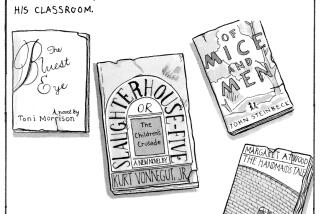‘Banned’ Lifts Lid Off Censored Fare : Television: England’s Channel 4 has been airing documentaries, films and TV shows that were suppressed or altered.
- Share via
LONDON — Throughout two decades in power, Brazil’s military regime enforced strict political censorship in the media. But the ruling generals never placed restrictions on the nation’s sex-film industry.
As a result, from the late 1960s to the early 1980s, some of Brazil’s most talented filmmakers made soft-core porn movies with underlying political messages as a means of subverting the military leadership.
The British television network Channel 4 documented this phenomenon in a 1983 program called “Brazil: Cinema, Sex and the Generals.” But what the Brazilian military permitted, the British TV authorities would not, and the network was barred from broadcasting the complete program.
Eight years later, the documentary is finally making its television debut in Britain as part of a themed “season” of programs about censorship that is airing throughout April on Channel 4. The special series, called “Banned,” consists of 70 hours of programs and films that were suppressed or altered or caused great controversy when they were first made or are themselves about censorship.
“We felt it was the right time to highlight the issue of censorship and to try to stimulate discussion about it,” said John Willis, Channel 4’s deputy director of programming, who organized the “Banned” season.
Programs such as “The Truth About Lies” examine how governments control the flow of information and decide what information people are allowed to know. Other works include the documentary “Sexual Intercourse Began in 1963,” which focuses on the obscenity trial that resulted from the 1960 publication of D. H. Lawrence’s “Lady Chatterley’s Lover”; a program titled “Dancing With the Devil,” which concerns attempts to suppress heavy-metal music, and the first British non-pay-TV broadcast of the Monty Python religious satire “Life of Brian.”
Numerous programs in the series address censorship in America, including “Damned in the USA,” a 75-minute documentary, newly commissioned by Channel 4, that looks at the American arts censorship battle and such key participants as the Rev. Donald Wildmon, Sen. Jesse Helms (R-N.C.), the National Endowment for the Arts, Robert Mapplethorpe and 2 Live Crew. Unlike virtually every other mainstream media examination of the issue, the British program actually shows the graphic Mapplethorpe photographs that prompted all the hoopla. Viewers are asked to decide for themselves whether they think the photos will cause harm if publicly displayed.
Also included is “Dark Circle,” the PBS documentary about the adverse health effects caused by nuclear weapons production in Rocky Flats, Colo. Kept off American airwaves for six years after its completion, the film won an Emmy after its 1989 broadcast.
Even “thirtysomething” makes an appearance. Channel 4, which airs the series each week in Britain, decided to rerun the episode that caused an uproar among American advertisers because it included a scene showing two men in bed. The episode passed without notice when it first ran in Britain.
The program on Brazilian sex films had been pulled from Channel 4’s schedule twice. The first time, the Independent Broadcasting Authority, what was then the British commercial television regulatory body, demanded the removal of clips from some of the Brazilian films discussed in the documentary. Channel 4 executives dropped the sex sequences, but then shelved the show when the IBA refused to let them include a statement explaining that certain scenes had been cut.
This time, inexplicably, “Brazil” is running in its entirety. “I think it was the statute of limitations,” quipped Channel 4 spokesman Chris Griffin-Beale.
Channel 4’s Willis says there is a key difference in the kinds of censorship that exist in Britain and the United States. “America is a much more open society,” he said. “On the other hand, there is a greater sense of economic pressure,” which comes to bear on anything that diverges from the norm.
“Britain is secretive, and America is conformist,” he said.
“The fact is that the bottom line is the dollar,” said Paul Yule, the British documentarian who filmed “Damned in the USA.” “Those who have the money can control the message. If the (American TV networks) could have advertisements all the time, they would.”
Another new documentary, “The Tube Is Reality,” explores the ways in which American television distorts reality without overt censorship. According to Channel 4, the film shows how “American network television creates a new kind of lie about the truth--the lie of a world already free of irreconcilable religious or political or ethnic conflicts, where emotions and personality matter more than ideas or politics, where American values are presented as the only universal values.”
The program also delves into the way advertisers generally refrain from direct censorship but exert pervasive control over programming “through their need for a basically conflict-free, optimistic, American-centered, bland flow of programs throughout the prime-time period, which won’t raise anxieties or basic doubts about life and values.”
Unlike in real life, problems and conflicts are always resolved on American television programs. As one British critic described TV in the United States: “Never banned, always bland.”
Censored works from other countries are well represented. Among them is a mini-festival of five Czech films from the late ‘60s with strong anti-Stalinist themes. All five were banned for more than 20 years after the Soviet invasion of Czechoslovakia in 1968.
Arranging to broadcast material that already has suffered the censor’s scissors required a certain amount of finesse and delicate negotiating by Channel 4 executives. Editing and scheduling concessions had to be made on several programs. But in most cases, Channel 4 has turned the alterations into part of the education process.
For the British broadcast premiere of a politically themed 1971 Yugoslav film called “W. R.: Mysteries of the Organism,” Channel 4 invited the film’s creator, director Dusan Makavejev (“Montenegro”), to edit two sexually explicit scenes that seemed certain to overstep British broadcast standards. Rather than snip the “offending” scenes, Makavejev highlights the cover-up.
Animated goldfish swim across the TV screen at exactly the crucial moments when a couple appear on screen, making love in an open field at Woodstock. Beautiful bursts of stars and rainbows emanate from the torso of a nude man in another scene.
In “Mother Ireland,” a documentary about the role of women there, the voices of some interview subjects are dubbed, even though they speak English. The surreal device is sometimes used by news programs in Britain to circumvent the 1988 law forbidding broadcasts of interviews with Irish terrorists.
A 1976 TV documentary series called “Sex in Our Time” was shelved when the regulatory body, the IBA, ruled that sequences of women examining their own bodies would have to be cut. Channel 4, airing one episode of the series, is still barred from showing those scenes. But rather that edit the film smoothly, the network has opted to leave blank space where the cuts occur.
In yet another case, Channel 4 has totally re-created a political documentary that was locked away before it could be shown. A 1986 film produced by the state-funded British Broadcasting Corp. documented a range of secret and questionable activities by successive British prime ministers, particularly Margaret Thatcher, who was then in power. BBC chiefs not only scrapped plans to broadcast the program, but also refused to sell it to Channel 4, which sought to air it. Thwarted from obtaining the film, Channel 4 has used the original script to remake the documentary, going so far as to re-shoot interviews with key witnesses.
Reaction to Channel’s 4 “Banned” series has been subdued. The network has received a generally low number of calls, with roughly equal numbers complaining and congratulating. Ratings have not been affected one way or the other, nor have there been any problems with advertisers.
Although editing and scheduling concessions had to be made--”Life of Brian” could not be shown until 10:30 p.m., for example--the network was only barred from presenting one program. Britain’s Independent Television Commission, which this year replaced the IBA as overseer of the nation’s commercial television, ruled that Channel 4 could not air a 12-minute film called “Dick,” which consists of still photographs of 1,000 male genitalia, with voice-over comments from several women.
Female nudity is common on British TV, and male frontal nudity is not unheard of. But in this case, said network spokesman Griffin-Beale, “I suppose the problem was quantity rather than quality.”
More to Read
The complete guide to home viewing
Get Screen Gab for everything about the TV shows and streaming movies everyone’s talking about.
You may occasionally receive promotional content from the Los Angeles Times.






